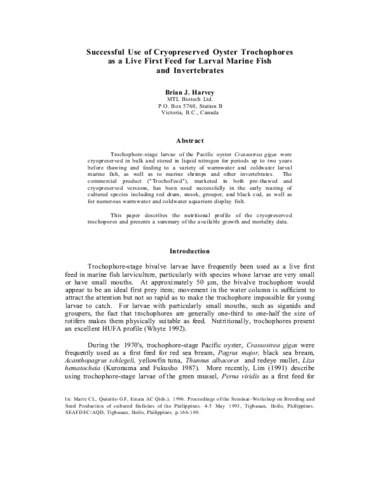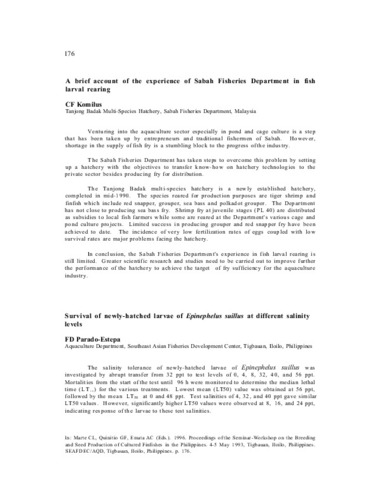The effect of background color and rotifer density on rotifer intake, growth and survival of the grouper (Epinephelus suillus) larvae
- Global styles
- MLA
- Vancouver
- Elsevier - Harvard
- APA
- Help
Share
Abstract
Rotifer intake and early growth and survival of Epinephelus suillus larvae were determined in terms of rotifer visibility against the background color of rearing tanks and density. The larvae were stocked at 30 l−1 in 200-l fiberglass tanks with phytoplankton (green water). Larvae were fed rotifers at densities of 5, 10 and 20 ml−1. Growth and survival were comparable among larvae in both tan and black tanks with green water. Rotifer intake was significantly higher in larvae in tan tanks. In black tanks, the survival of larvae at Day 14 was enhanced by the high rotifer density of 20 ml−1. Rotifer intake and growth of larvae were similar at all densities.
Suggested Citation
Duray, M. N., Estudillo, C. B., & Alpasan, L. G. (1996). The effect of background color and rotifer density on rotifer intake, growth and survival of the grouper (Epinephelus suillus) larvae. Aquaculture , 146(3-4), 217-224. https://doi.org/10.1016/S0044-8486(96)01375-0
Type
ArticleISSN
0044-8486Koleksi
- Journal Articles [1262]
Related items
Showing items related by title, author, creator and subject.
-
Successful use of cryopreserved oyster trocophores as a live first feed larval marine fish and invertebrates
Harvey, Brian J. (Aquaculture Department, Southeast Asian Fisheries Development Center, 1996)Trochophore-stage larvae of the Pacific oyster Crassostrea gigas were cryopreserved in bulk and stored in liquid nitrogen for periods up to two years before thawing and feeding to a variety of warmwater and coldwater larval ... -
Larviculture of marine species in Southeast Asia: current research and industry prospects
Marte, Clarissa L. (Elsevier, 2003)The increased requirement for food fish, the lucrative market for expensive seafood, and the need to conserve marine resources, have motivated the rapid pace of larviculture research in Southeast Asia. Various research and ... -
A brief account of the experience of Sabah Fisheries Department in fish larval rearing
Komilus, C. F.; Parado-Estepa, F. D. (Aquaculture Department, Southeast Asian Fisheries Development Center, 1996)Venturing into the aquaculture sector especially in pond and cage culture is a step that has been taken up by entrepreneurs and traditional fishermen of Sabah. However, shortage in the supply of fish fry is a stumbling ...






